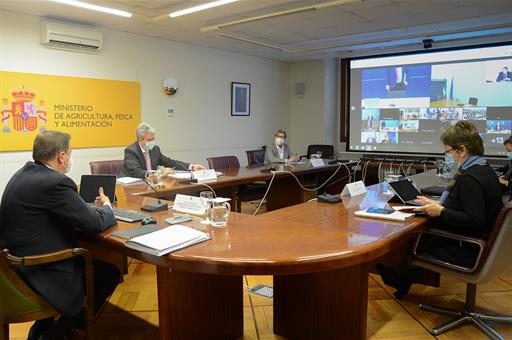At the first EU Agriculture and Fisheries Council meeting held under the half-yearly Portuguese Rotating Presidency, and also the first in the wake of Brexit, three main issues were discussed: the reform of the Common Agricultural Policy after 2020, trade-related issues and fishing possibilities for shared species with the UK.
Minister Luis Planas stated that, "following the agreement reached with the UK, it is essential to definitively set the Total Allowable Catches (TAC) and the fishing quotas of shared stocks which remained pending in December, to guarantee the interests of the fisheries sector". He also pointed to the need for certainty and speed.
The minister expressed his support for the document of the Rotating Presidency that will serve as a guide for the development of the European Commission's consultations with the UK. This process must be addressed with "all due guarantees and without delay", while maintaining unity of action and safeguarding the role that corresponds to EU institutions. This is a novel exercise in which the principles of the Common Fisheries Policy must prevail, together with the maximum sustainable yield of the fisheries.
As regards Atlantic species, the quotas related to the obligation of direct landing is of concern, such as Celtic cod and cod from waters to the west of Scotland, megrim and anglerfish in Zone 6 of the Great Sol fishing grounds, as well as sea bream and alfonsinos.
Also in relation to the TAC and the definitive quotas for 2021, although beyond the bilateral scope with the UK, the minister urged the TAC to be set for mackerel, due to the upcoming start of its fisheries season in Spain, and white tuna, a sector in which Spain is opposed to suffering the penalty imposed by other countries overfishing.
Trade relations
On another note, in the Council's review of the EU's trade agreements, Minister Planas advocated striking the right balance between the establishment of sound trade relations and a competitive European agriculture sector that can offer people the products they demand, which are becoming increasingly more demanding in such aspects as well-being, health and environmental protection.
He advocated the capacity of trade agreements as a driver of productive change at a global level. In this regard, Europe must not only export agri-food products but also its production model. Respect for a level playing field between the European productive model, which has certain requirements - environmental, health, phytosanitary and animal well-being - and that of third countries requires guarantees of reciprocity with a view to maintaining the competitiveness of Spanish products.
He also called for the Commission to speed up contacts with the new United States Administration with the aim of eliminating unfair customs duties as soon as possible that are prejudicing Spanish agri-food products and those of other European countries.
CAP
One of the priority goals of the Council is to finalise the negotiations on the three Regulations that make up the legislative package of the future Common Agricultural Policy and reach an agreement this spring.
Spain shares this desire to shore up the Regulations on the future CAP in the coming months and has conveyed its support to the Portuguese Rotating Presidency for achieving a satisfactory agreement on which progress in designing Spain's future agricultural policy depends.
Non official translation





